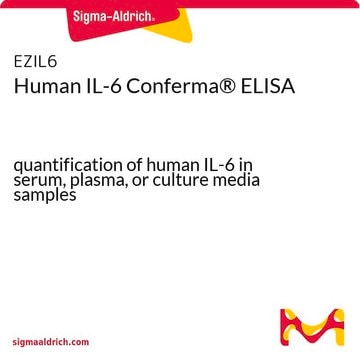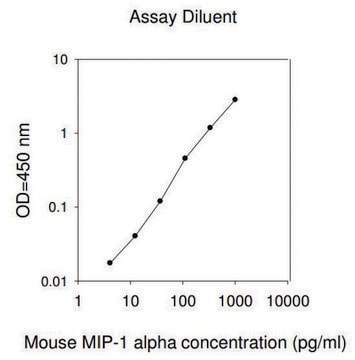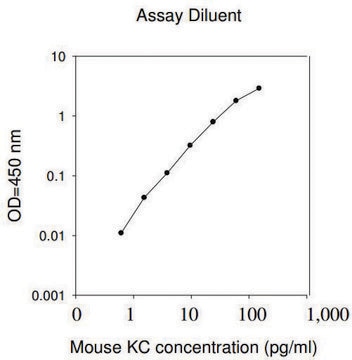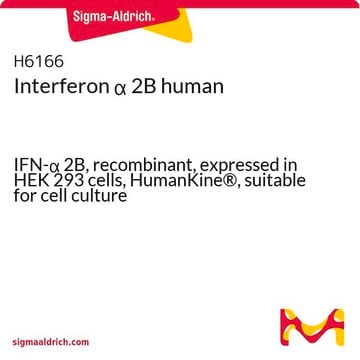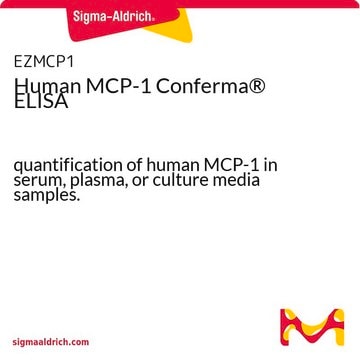RAB0077
Mouse RANTES / CCL5 ELISA Kit
for serum, plasma and cell culture supernatant
Sign Into View Organizational & Contract Pricing
All Photos(2)
About This Item
UNSPSC Code:
41116158
NACRES:
NA.32
Recommended Products
species reactivity
mouse
packaging
kit of 96 wells (12 strips x 8 wells)
technique(s)
ELISA: suitable
capture ELISA: suitable
input
sample type cell culture supernatant(s)
sample type serum
sample type plasma
assay range
inter-assay cv: <12%
intra-assay cv: <10%
sensitivity: 1 pg/mL
standard curve range: 0.82-200 pg/mL
detection method
colorimetric
shipped in
wet ice
storage temp.
−20°C
Gene Information
mouse ... Ccl5(20304)
General description
The Mouse RANTES (acronym for Regulated upon Activation, Normal T cell Expressed and presumably Secreted) ELISA (Enzyme-Linked Immunosorbent Assay) kit is an in vitro enzyme-linked immunosorbent assay for the quantitative measurement of mouse
Immunogen
Recombinant Mouse RANTES
Application
For research use only. Not for use in diagnostic procedures.
Please refer to the attached General ELISA KIT Procedure (sandwich, competitive & Indirect ELISA)
Please refer to the attached General ELISA KIT Procedure (sandwich, competitive & Indirect ELISA)
Other Notes
A sample Certificate of Analysis is available for this product.
Please type the word sample in the text box provided for lot number.
Please type the word sample in the text box provided for lot number.
Kit Components Also Available Separately
Product No.
Description
SDS
- RABELADAELISA 1X Assay/Sample Diluent Buffer A (Item D1)SDS
- RABELADBELISA 5X Assay/Sample Diluent Buffer B (Item E1)SDS
- RABELADCELISA 1X Assay/Sample Diluent Buffer C (Item L)SDS
- RABSTOP3ELISA Stop Solution (Item I)SDS
- RABTMB3ELISA Colorimetric TMB Reagent (HRP Substrate, Item H)SDS
- RABWASH420X Wash Buffer (Item B)SDS
Signal Word
Warning
Hazard Statements
Precautionary Statements
Hazard Classifications
Met. Corr. 1
Storage Class Code
8A - Combustible corrosive hazardous materials
Choose from one of the most recent versions:
Already Own This Product?
Find documentation for the products that you have recently purchased in the Document Library.
Joy Ngwainmbi et al.
The Journal of neuroscience : the official journal of the Society for Neuroscience, 34(43), 14243-14251 (2014-10-24)
The gastrointestinal (GI) tract presents a major site of immune modulation by HIV, resulting in significant morbidity. Most GI processes affected during HIV infection are regulated by the enteric nervous system. HIV has been identified in GI histologic specimens in
Arsheed A Ganaie et al.
Molecular cancer therapeutics, 19(12), 2598-2611 (2020-10-02)
S100A4 oncoprotein plays a critical role during prostate cancer progression and induces immunosuppression in host tissues. We hypothesized that S100A4-regulated oncogenic activity in immunosuppressed prostate tumors promotes growth of neoplastic cells, which are likely to become aggressive. In the current
Michael Bauer et al.
Science advances, 7(51), eabl7150-eabl7150 (2021-12-18)
Antiviral defense and virus exclusion from the cell nucleus restrict foreign nucleic acid influx and infection. How the genomes of DNA viruses evade cytosolic pattern recognition and cross the nuclear envelope is incompletely understood. Here, we show that the virion
Xiaojuan Liu et al.
Cell death & disease, 11(11), 1016-1016 (2020-11-29)
Wet age-related macular degeneration, which is characterized by choroidal neovascularization (CNV) and induces obvious vision loss. Vascular endothelial growth factor (VEGF) family member VEGF-A (also named as VEGF) and its receptor VEGFR2 contribute to the pathogenesis of CNV. Choroidal endothelial
Egle Cekanaviciute et al.
Journal of immunology (Baltimore, Md. : 1950), 193(1), 139-149 (2014-05-27)
The balance between controlling infection and limiting inflammation is particularly precarious in the brain because of its unique vulnerability to the toxic effects of inflammation. Astrocytes have been implicated as key regulators of neuroinflammation in CNS infections, including infection with
Our team of scientists has experience in all areas of research including Life Science, Material Science, Chemical Synthesis, Chromatography, Analytical and many others.
Contact Technical Service